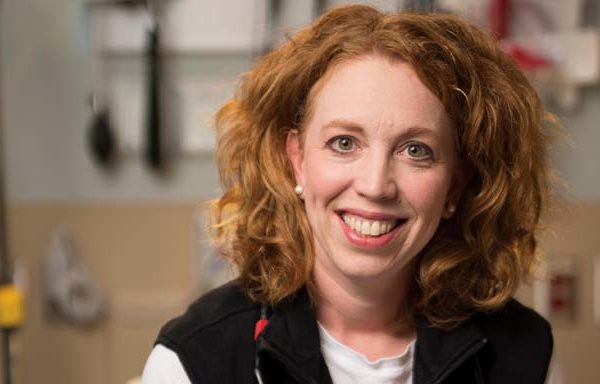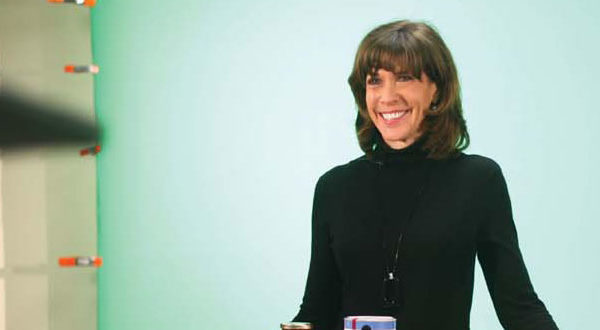Q+A: An Interview with Sarah Fogel
Vanderbilt Nurse recently sat down with Sarah Fogel, PhD, RN, director of the newly re-named Associate Degree in the Science of Nursing to MSN (ASN to MSN) program. Fogel has more than 20 years’ experience as a nurse and nursing educator on top of her first career as a concert violist. She has been on faculty since 1995, and became director in 2013. She shares how she and her team are re-engineering the program to make it more valuable than ever before.
Why the name change?
This program was called the RN PreSpecialty Program, but we changed it so it could have its own more specific identity. The former name was confusing to prospective students because some without nursing experience thought this was the entry point to the master’s program, when really the ASN (Associate Degree in the Science of Nursing) to MSN program is for associate degree nurses and diploma nurses in pursuit of an advanced practice nursing degree.
What is the program?
It’s a two semester (fall and spring) schedule with the summer off. This program fills the holes in between an associate degree education and a bachelor’s degree in nursing. Associate programs typically do not address theory and research or community health nursing. They don’t delve as deeply into pharmacology and pathophysiology as bachelor’s programs in nursing do.
Are you revising it in any way?
We are building a new curriculum that emphasizes nursing science and education. We are adding a pharmacology course and weaving in more pathophysiology in our Health and Illness Across the Lifespan class. We are going to use a competency-based format; allowing students to move to advanced pharmacology and pathophysiology in their first year, if they qualify.
Who does it appeal to?
In the last few years, the program was particularly attractive to associate degree nurses who had been practicing a long time and wanted to further their careers to advanced practice. While those folks are still a big part of our student body, recently we have seen more second degree students enter the program. Some have had careers in other areas unrelated to health care. They want to first test the waters and learn more about nursing and confirm that pursuing advanced practice is right for them. It’s exciting to see students make that transformation.
What is the culture and tone of the program like?
We’ve always had wonderful groups of students with great real-world and nursing experience. Now we see all that meshed with ASN nurses coming from the business world, policy positions, public health and all sorts of different backgrounds that offer different perspectives, particularly in advanced practice nursing. I have taught in this program for 19 years and love it in large part because of the really rich and fortifying discussions throughout the courses with students with such diverse nursing backgrounds.
What is the delivery method?
We teach in a block format, which means students don’t have to give up their full-time jobs or the lives they have built to move to Nashville. Students come to VUSN for face-to-face blocks of four days, three times a semester. The balance of the coursework takes place asynchronously via streaming and interactive methods that students can view and participate in at home and fit into their own schedules. During block time, discussion is a big part of most of our classes. We do very little lecturing while on campus and instead use that time for seminars, dialogue and hands-on learning.
Why is this program a good investment for a current registered nurse?
It’s fast, thorough and we value each student’s experience. An incoming RN can attend our program and go from being a front-line nurse to becoming an advanced practice nurse in just two years—with a summer off in between. Most people in the program continue to work full time through their first year and continue to work in some capacity while pursuing their advanced practice specialty. Out of our current class of 25 students in their first year, all but three are working full time.
Are incoming associate degree nurses intimidated?
It can be intimidating to come here as an associate degree nurse, so our faculty works very hard to work through any of those issues. We make sure these nurses realize their gifts, talents and contributions to their discipline and profession. This program is a perfect application of adult learning theory. The faculty and I think it is exciting to work with students, each with so much experience in life and in their profession, and help them reframe what they know, and then to apply that knowledge in different ways. This process seems to erase any apprehension or intimidation pretty quickly. The faculty sees it as our job to help students overcome any obstacles and unleash their potential.
As incoming program director, are you making any changes to the program?
Dr. Carolyn Bess built and sustained this program for many years. When she retired, I became interim and then permanent program director. I’ve gained new insight listening to students and faculty, and I’ve challenged faculty to question the status quo. So in addition to providing the essentials of baccalaureate nursing, we are focusing on the transition to advanced practice nursing.
Is it more challenging to teach this group knowing students will later pursue a variety of special tracks as part of their master’s coursework?
That’s not a challenge at all. It’s actually part of the rich experience of this group. They come from different backgrounds, learning together for a year and then going on to different specialties in their pursuit of a master’s degree.
How would you describe your faculty?
In one word: Enthusiastic! Everyone brings their experience and talents together in a way that is best for our students. Our team consists of very experienced nurses and educators. Our senior faculty provides wisdom and our junior faculty provides freshness. It all comes together quite nicely.
You have been teaching in this program for 19 years. Tell us about the transformation students make.
I can illustrate that through something I observed this semester that was just brilliant. When our students joined the program in August, they were timid and closed when it came to class discussions. During the fall semester, I noticed they were opening up more. Then, at the beginning of the second semester, Dean Linda Norman joined our class to engage in a simulation game to identify cultural issues nurses need to address. There was so much personality in the room! The students were confident, expressive and articulate. In August, they might have been inhibited, but by second semester, they were not afraid to speak up. They even joked with the Dean! I sat silently in the back of the class with a big smile on my face.
Our program is about unleashing our students’ abilities to contribute to the conversation, ask questions, think and wonder why. Everything about the students in our program changes. I see the confidence that grows in clinical settings as well.
How many new students do you have each year?
We range from 20 to 30 students per incoming class. We are not about size, we are about quality, and our students develop close bonds with their classmates.
What makes the Vanderbilt program different?
Through surveys our students tell us how much they value the interaction with their classmates and faculty during their blocks and how much they like that the asynchronous learning allows them to work and live where they want. It’s a nice mix of classroom and work at home.
Can you give me a specific example of a student who has flourished throughout the program?
There are many, but the one that quickly comes to my mind is Laura Young. Laura was an associate degree nurse working at a local mental health facility when she joined our program as a part-time student. I got to know Laura during her first year, and we kept in touch as she progressed into our Psychiatric-Mental Health MSN program. She had life changes like having a baby while being a student. She also had a huge desire to learn, and realized that she wanted to earn her Doctor of Nursing Practice. I had the honor of being her faculty chair through the entire program as she developed a training module for standardizing charge nurse orientation in Tennessee’s Mental Health facilities. Now Laura is Nurse Consultant to the Assistant Commissioner for the Division of Hospital Services, Tennessee Department of Mental Health and Substance Abuse Services, and oversees nursing in all of the state-operated mental health hospitals in Tennessee. Laura’s story is impressive, and all of our students have their own stories of transformation.
What do you want everyone to know about this program?
This program is a lot of work on everyone’s part—students and faculty. The members of our faculty complement each other so well and each group of students challenges and inspires us. But most of all, it’s a wonderful experience that prepares ASNs to be successful in an MSN program and into advanced practice. It’s fun.







